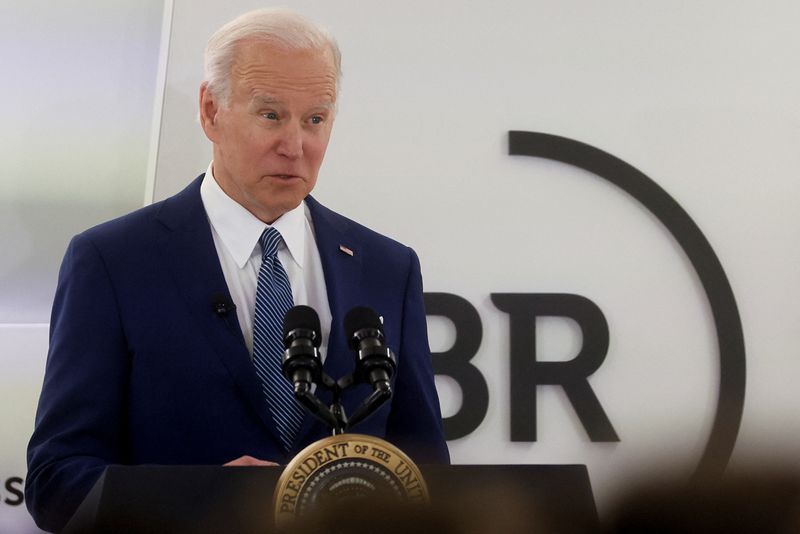By Jarrett Renshaw
WASHINGTON (Reuters) -U.S. President Joe Biden has few appealing policy options to get record high U.S. gasoline prices under control ahead of the critical summer driving season, when millions of Americans fill their tanks and hit the road for vacations.
"The President and our national security team and our economic team are working overtime right now to evaluate and examine a range of domestic options," White House spokeswoman Jen Psaki said on Tuesday.
Publicly, White House officials have said all options are on the table. They have not detailed all of them, but they include a gasoline tax holiday or gas cards that would provide rebates to consumers; possible relaxation of the Jones Act, a law requiring domestic cargo to be carried on American-made tankers using union labor; and lifting of sanctions on oil-producing nations.
Privately, officials say all these options are politically complicated and few of them may actually lower gas prices much, according to two sources familiar with the administration's thinking.
“They are perusing the menu and can’t find anything they want to eat,” said Stephen Brown, a veteran oil lobbyist who consults energy companies.
U.S. pump prices reached all-time highs last week following Russia's invasion of Ukraine. Retail gasoline prices have eased from a record of $4.331 hit on Friday but remained at $4.237 per gallon on Wednesday, according to American Automobile Association data.
While fuel prices are soaring around the world, Republicans in the U.S. Congress blamed Biden's energy policies. Many think the issue can boost their chances during midterm elections in November.
Biden "is faced with an angry electorate who sees the price of the pump more frequently than the suffering of the Ukrainians," said Ed Hirs, an energy economist at the University of Houston.
Hirs said policy options can help lower gasoline prices modestly but will not do much about the real problem: soaring crude oil prices, which remained at around $120 a barrel even after retreating substantially from a high of roughly $139 a barrel on March 7.
The administration has urged energy companies to boost U.S. crude output from its current 11.6 million barrels per day, but analysts say that will not be easy.
"The US public thinks increasing (oil) production in the U.S. is like FedEx (NYSE:FDX) overnight delivery, but it’s more like the stagecoach," said Andrew Lipow, president of Lipow Oil Associates in Houston.
TAX HOLIDAY
A federal gas tax holiday would not reduce prices much, but would hurt financing for infrastructure projects that rely on the revenue. A motorist buying 10 gallons, costing over $40 at current prices, would save less than $2 if the federal gas tax were waived.
The federal gas tax is just over 18 cents a gallon; most states impose a higher one. The highest is Pennsylvania's at 57.6-cent-a-gallon followed by California's 53.3 cents. Several states, such as Florida and Maryland, are moving to suspend their gas taxes.
Lawmakers have asked U.S. refinery officials for input on the gas tax holiday, according to numerous interviews, and the answers were not encouraging.
"We are telling them that it will not have a large impact on gasoline prices. ... to lower gas prices, it starts with lowering oil prices," said a top official at a U.S. refiner.
MORE ETHANOL?
A bipartisan group of Farm Belt lawmakers has been pushing the White House to lift the summertime ban on higher ethanol blends of gasoline, called E15, which is now cheaper than the standard E10 fuel. But E15 is prohibited in the summer due to smog concerns, and White House climate officials oppose lifting the prohibition.
Also the refining industry bitterly opposes boosting ethanol consumption, and the step would increase demand for corn at a time when high food prices are adding to inflation.
Asked about E15 gasoline, Psaki responded only that it was "in the menu of options."
JONES ACT
Waiving the Jones Act could help move oil to refineries on the East and West Coasts, but could anger labor unions. Washington has temporarily taken the step during emergencies such as when hackers shut down the largest U.S. fuel pipeline.
"There is no way the White House does this," said one refining source. "There's a history of lifting this during supply concerns, that's not the problem."
GAS CARDS
The White House considered giving Americans gas cards to help offset high prices, but ditched the plan for now due to opposition from lawmakers who questioned the effectiveness, according to a source familiar with the discussions.
Some worried that issuing gas cards would be cumbersome for the Internal Revenue Service and could delay income tax returns. A senior administration official cited fraud concerns, noting that cards have been stolen out of mailboxes.
“We are talking to Congress about all ideas, all have a good and a bad,” the official said.
VENEZUELA, IRAN
This month, U.S. officials met Venezuela President Nicholas Maduro for the first bilateral talks in years, and the lifting of sanctions was discussed.
But Venezuela's opposition leaders are pressing Washington to condition any easing of oil sanctions on political concessions.

Separately, the United States and Iran have made progress on a nuclear deal that could add more oil to the tight market.
Republicans and others have criticized negotiations with Venezuela and Iran, saying the White House is caving in to dictators.